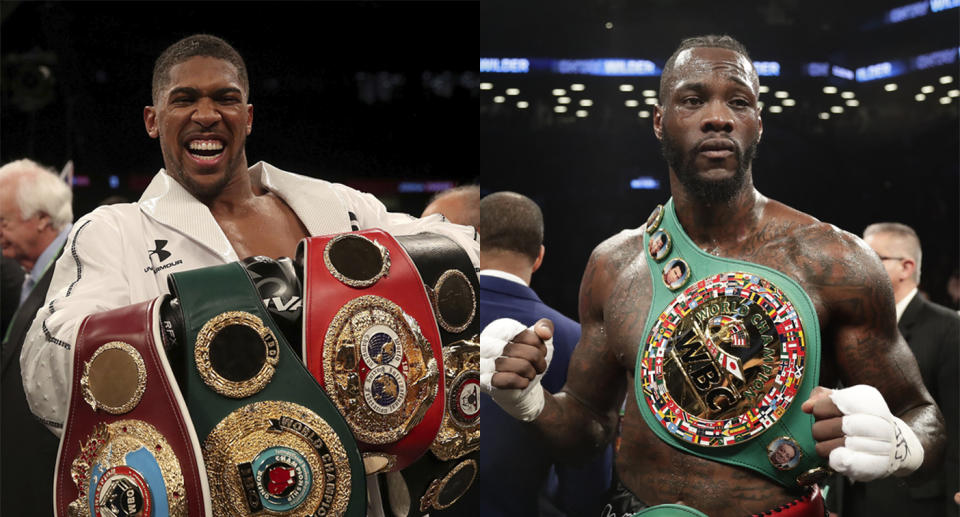Anthony Joshua and Deontay Wilder could use a lesson in the art of the deal

The negotiations that led to Floyd Mayweather Jr. and Manny Pacquiao finally meeting in May 2015 were a tortured, mind-numbing mess.
They are, though, illustrative when it comes to understanding what is happening in talks between IBF-WBA-WBO heavyweight champion Anthony Joshua and WBC heavyweight champion Deontay Wilder for a mega-unification fight this year.
There is no one who can rightly call themselves a boxing fan who would rather see Joshua face Jarrell “Big Baby” Miller next, or see Wilder fight Dillian Whyte in his next outing.
The fight to make, of course, is Joshua-Wilder. It will do around a $20 million gate at T-Mobile Arena in Las Vegas, perhaps a couple of million better. It will sell at least 1.5 million on pay-per-view and would have a decent chance of eclipsing two million.
It would be the rare boxing match that would transcend the sport and would cross over into the mainstream.
And yet, we’re subject to the same garbage we were subjected to for years in the Mayweather-Pacquiao negotiations: Posturing, negotiating in the media, placing blame on everyone else.
The Mayweather-Pacquiao fight got made not because of Mayweather adviser Al Haymon, or Mayweather Promotions CEO Leonard Ellerbe, or Pacquiao adviser Michael Koncz or Top Rank promoter Bob Arum.
It was finally made, more than five years after talks commenced, because the fighters themselves insisted upon it. You may recall that January night in 2015 when both boxers showed up at a Milwaukee Bucks-Miami Heat game. They met at half-court at halftime, and later in Pacquiao’s Miami hotel suite after the game.
That ensured the fight was done. They wanted it and they instructed their representatives to negotiate a deal.
And that is what has to happen here, and what clearly is not happening yet. After Wilder’s side made public a $50 million offer to Joshua last week, Joshua promoter Eddie Hearn downplayed it. He told Sky Sports, “There is no deal. There is no contract. There is no serious offer. We have to determine if it is a PR move or a genuine offer.”
The easiest way, of course, to determine that would be to say yes and ask for a contract to sign.
That didn’t happen, so it indicates Hearn is still posturing. If he’d have said yes, then the burden would have switched to Wilder’s side to follow through.
Hearn can question the legitimacy of the offer all he wants, but clearly the money is there. Few doubt it could do a $20 million gate in Las Vegas, and perhaps a few million less in the U.K.
If the fight sells 1.5 million pay-per-views in the U.S. at $74.95 apiece, that’s a gross of $112.4 million in pay-per-view revenue here alone. It will generate many more millions in rights fees and pay-per-view sales worldwide.
It wasn’t an outrageous offer by any means.
Joshua has the bigger following and he holds more belts, so he has some leverage. The prospect of a fight with Tyson Fury also provides him leverage, however unlikely it is that Fury is able to return to competition.
A Joshua-Fury fight would be over-the-top huge in the U.K., though far less significant in the U.S.
Fury is scheduled to fight June 9 against the always tough TBA in Manchester, England. He’s encountered all sorts of personal issues since dethroning Wladimir Klitschko on Nov. 28, 2015, and hasn’t fought since. He reportedly ballooned to nearly 400 pounds at one point, but pictures he posted of himself recently show him appearing more fit.
But if the Joshua-Wilder fight is held for the undisputed heavyweight title, as it should be, Fury would be a great first opponent for the winner. As massive as it would be in the U.K. if a Joshua-Fury fight were announced tomorrow, it would be even bigger if Joshua went to it off a win over Wilder that made him undisputed champion.
And while a Wilder-Fury fight in the U.S. today wouldn’t be that big of a deal, it would be significantly bigger should Wilder win the undisputed crown and Fury looked good in a comeback win.
So don’t be deceived by what Hearn might say, or what Wilder co-manager Shelly Finkel says.
Pay attention not only to what Joshua and Wilder say, but also to what they do.
Their actions will be the only real indicator if there is any momentum toward making the bout that the world wants to see, or whether it will be business as usual in the sport.
More from Yahoo Sports:
• Jeff Passan: How 7 teams personify baseball’s ugly problem
• Pirates rookie breaks 50-year-old record in debut
• MJ’s teammate: LeBron has best body of work
• Final grades: How did your team fare in NFL draft?


